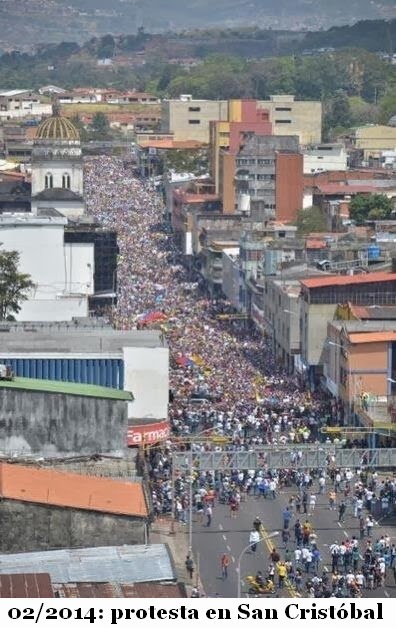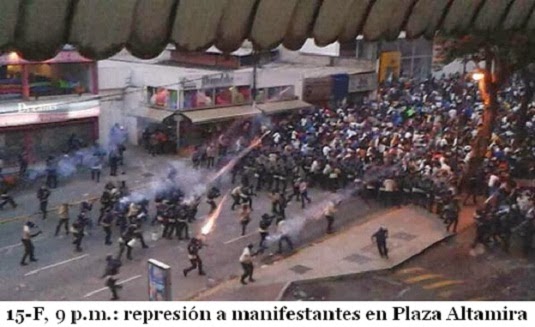Translation of “One comrade from Mérida sounds off: Oh I’ve got the desire” (Viento sin Fronteras, in EL LIBERTARIO)
Here is another translation from Venezuela, once again of a one-compa-sounds-off article, this time from Viento sin Fronteras
(Wind without Borders
) in a rural area of Mérida, a state in western Venezuela. The article was reprinted by the Venezuelan anarchist newspaper EL LIBERT@RIO. Inline links and editorial notes in footnotes are added by me. As always, the same caveats apply: I'm a nervous translator trying to keep up with a lot of regional references that I don't always know, and moving through a lot of material coming out more quickly than I can translate it; this is a working draft; if you notice any mistakes or mangling please feel free to point them out in the comments, and I'll attach a note or a correction to the text here. Again, there are lots of different Anarchists in Venezuela, and this is one compa’s view; there are many with different views about the attitude that Anarchists should take towards the protest. (See, for example, this previous translation of a commentary by Victor Camacho. Viento sin Fronteras is, let’s say, significantly more hands-on.
)
A comrade from Mérida sounds off: Oh, I’ve got the desire
Viento sin Fronteras
This is a little chronicle many are certainly familiar with. Yesterday I got up at 6 a.m. so I could get ready to go to work. I arrived at work around 7:30 am and I spent the whole day over there. At 7pm I went back to my house. When I got home I had to go down to the nearest bodega (I live in a rural area) to buy stuff for making dinner or lunch in the coming days. Well O.K., so a purchase that consists of some three potatoes, two cans of sardines, three tomatoes, an onion, laundry soap,[1] a box of cigarettes and a few cookies, comes out to 170 bolivars [!!!@@e2;2030;2c6; US $27]. Up to this point everything seems normal but it isn’t. My daily salary is 200 bolivars [!!!@@e2;2030;2c6; US $32].
Clearly, they are 200 bolivars and this leaves me only just 30 bolivars [!!!@@e2;2030;2c6; US $5] to save for paying the rest of my expenses, like the rent for example. Or the fare for public transport, if I weren’t walking to work I’d have to take 10 bolivars off these 30 that are supposed to be left over for me.
Besides this, I remembered that the last time that I went without natural gas nearly a month passed before that commodity came back to my house. And I my house, of course, a little house of 38 square meters [!!!@@e2;2030;2c6; 409 sq. ft.] where the water shuts off every day for an hour or two, with a rent that’s equivalent to nearly half the minimum wage I work for. It brings to mind that house from the housing project[2] that that the showboat[3] of the Communal Council[4] built (great affiliate of PSUV[5] certainly and an ideological reference for many here) and which was empty until two weeks ago, which he managed to sell, for no less than the discreet sum of 700,000 bolivars [!!!@@e2;2030;2c6; US $ 111,250].
Something comes into my mind, and my nerves get hotter. I spent 10 years of my life in college. I have an undergraduate degree, a master’s, and I left my doctoral thesis half done when I lost interest. And O.K., it’s not that I believe that I deserve a Ministry salary, but for some reason, and this reason for some other reason always ends up being my fault; it has been impossible for me to find a job that, without being exactly the thing for which I supposedly studied at least would permit me (and that’s what college is supposedly about) to give back to society or to whoever, a little bit of that intellectual or technical material that I supposedly acquired in those years. At times, they then give me some moments of clarity and I say: clearly, it’s that to get hooked up you have to know whose balls to yank.[6] Or I think and I swear[7] about how to set up that writing project with the ever sacrosanct words: Eternal Commander, Fellow Comrade, the Little Bird, Our Process, the Economic War, the Eternal Giant, the Legacy.[8] All this without a doubt adds to the degree of a feeling of frustration that’s growing.
And with that, what comes into my head are the contracts for the Guasare coal, the Deltana Plate, the three billion dollars that Chevron loaned us, the concessions to Chinese timber companies in the high Caroní, the death of the Sabinos, the criminalization of the Wayuu, the Red Fascist wall shooting dissident unionists, the armed forces of the government holding old women with their pans at gunpoint, ordering them to be quiet, the dead of Uribana, the 400 dying every year in prison, the intellectual authors of the massacre of El Amparo placed in the government designing the anti-terrorism laws. And so on. And so I think that late or early, me, and many people who aren’t identified one bit with the spokespeople of the opposition parties, including folks who come from the Chavista movement, are getting out into the streets to protest. And I’ll be over there, if country life lets me, handing out pamphlets to anyone who has eyes to read them. Without falling into naivete, I know that there will be plenty of imbecile fanatics for Pérez Jiménez[9] or Leopoldo Lopez[10] there with their slogans and believe me that I’ll fight them right there. Right there I’ll show that they’re the same as the others.
Oh, I’ve got the desire[11] to go out hurling stones when the police car crosses my path. Because they are some thugs and some cheerleaders.[12] Oh, I’ve got the desire to take all the trash that they aren’t capable of managing and set it all on fire in the doorway of the Mérida state government. Oh, I’ve got the desire to smash the windows of the supermarket and leave all those products tossed on the floor that I have to wait in line for on my weekend days. Oh, I’ve got the desire to catch an ATM[13] alone and try once and for all to see how the fuck you can withdraw all the money with a sledgehammer.
I’ve got the desire to give thanks in person to the folks who set SEBIN’s trucks on fire[14] because they’re a murdering intelligence agency that tortures and persecutes political dissidents. I’ve got the desire to go up to that student leader, who’s really an ally of PJ,[15] and tell her to shut her mouth, that she’s a wanker,[16] that it’s her fault (and that of those mamelotracios[17] that she obeys) that the protest — which could have been a good way to lock up the pigs[18] and a place where we’d all recognize that all these demands are the vindication urgent for EVERYONE — was converted instead into a slogan, pretty much belonging to their own partisan interests.
The year is just beginning and it doesn’t promise to be a year for calm ones. Well, let the storm come.
— Ganas no me faltan (21 Feb. 2014). Very imperfectly translated by Charles W. Johnson
- [1]Lit.
jab?@c3;b3;n azul,
a specialized kind of soap used especially for laundry (although it can also be used for household cleaning or for personal hygiene).↩ - [2]
misi?@c3;b3;n vivienda,
a huge public housing construction project launched as part of theBolivarian Missions
sponsored by the government, and administered through government-approved community councils.↩ - [3]
Cantama?@c3;b1;anas,
more accurately, someone who promises to do something and never does it.↩ - [4]Orig. Spanish:
CC,
i.e.,Consejo Comunal,
a local council which, among other things, administers government funds granted under the Bolivarian Mission programs.↩ - [5]United Socialist Party of Venezuela, the current ruling political party.↩
- [6]Venezuelan slang,
jalar bolas,
lit. to pull balls, fig. to flatter or sweet talk with an ulterior motive.↩ - [7]Ambiguous:
reniego,
meaning either potentially reneging, cursing, detesting, renouncing a religion, or, significantly given the context, uttering blasphemy.↩ - [8]
comandante eterno, compa?@c3;b1;ero camarada, el ara?@c3;b1;ero, nuestro proceso, la guerra econ?@c3;b3;mica, el gigante eterno, el legado,
all nicknames or honorary phrases associated with the Bolivarian Socialist government and especially with the cult of personality around Hugo Chávez.↩ - [9]Presumably Marcos Pérez Jiménez (1914-2001), right-wing military dictator of Venezuela 1952-1958. A few of the more right-wing opposition groups explicitly identify their goals with
perezjimenismo.
↩ - [10]Leopoldo L?@c3;b3;pez Mendoza, leader in the right-wing political opposition party Voluntad Popular, arrested earlier this month and imprisoned on
terrorism
charges after the outbreak of street protests in Venezuela.↩ - [11]
Ganas no me faltan,
common phrase, meaningI don’t lack the desire
orI don’t lack the urge.
↩ - [12]
Matraqueros,
lit.those who use matracas,
a kind of spinning noise-maker popular with diehard Latin American sports fans.↩ - [13]
Cajero del banco,
which can refer either to an ATM or to a human teller. From the reference to smashing with sledgehammers, I assume (hope?) from context that this is referring to smashing up a machine to get at the cash inside of it.↩ - [14]Servicio Bolivariano de Inteligencia Nacional, the main national intelligence agency and political police force in Venezuela.↩
- [15]Primero Justicia, a center-right party in the political opposition, run by Henrique Capriles, a right-wing opposition leader who has condemned the street protests.↩
- [16]
Pajua,
frompaja,
lit. masturbation or fig. wankery, in the sense of talking bullshit.↩ - [17]Original Spanish, untranslated. I don’t have a good idea of what this means, even after consulting with native speakers from South America. (It’s not in any slang dictionaries I have access to, either.) Our best guess is that it’s probably a portmanteau profanity of some kind and that it’s probably intended to suggest something like
cocksuckers.
↩ - [18]I am not at all sure that this is a correct translation. Orig. Spanish:
que podría haber sido una buena tranca de cochina.
Tranca
is a lock or a door-bolt,cochina
literally meanssow,
butcochino/a
are also used as the masculine and feminine forms of an insult meaningnasty
ordirty.
This phrase, taken as a whole, doesn’t seem to be an idiomatic expression, or at least, does not seem to occur anywhere else on the Internet.↩

